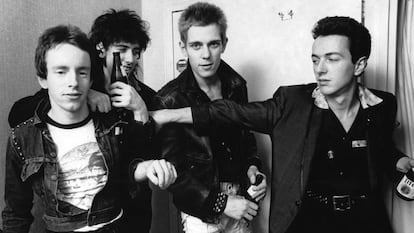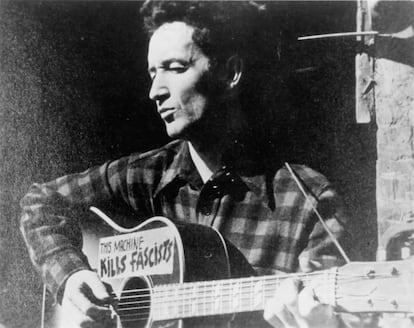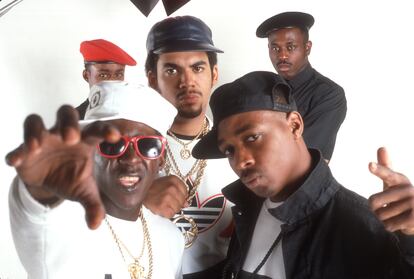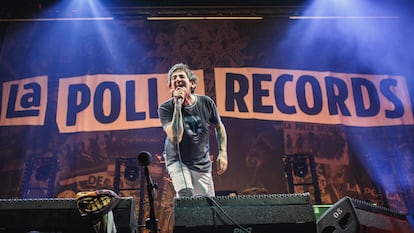The influence of music on politics: Can punk, folk, or rap change the world?
An essay on the sociopolitical themes in the lyrics written by Joe Strummer, lead singer of The Clash, has inspired the debate about the impact popular songs have on an individual’s ideological views


Whatever the medium, the outcome is the same. Picture it, you are in high school and a friend makes you a mixtape on cassette: what you hear on it makes you see the world in a different way. You have had your eyes opened to this or that injustice, this or that act of resistance, and you experience the music with an emotion you have never had before. The world is wrong, we can fix it, we must try. Your political worldview will never be the same, and that musical discovery may decide your opinions (and your vote) throughout your life. That is the power of music to influence the formation of people’s ideological identity. It is not to be sniffed at.
Joe Strummer (1952-2002), frontman of The Clash, collaborated in the politicization of the punk movement — so nihilistic in its outlook — and his commitment was reflected in the lyrics of all his musical projects, as analyzed in the recent essay The Punk Rock Politics of Joe Strummer: Radicalism, Resistance and Rebellion, by Gregor Gall. Anti-fascism, anti-racism, anti-imperialism, criticism of inequality, and defending the oppressed were some of the issues that the British artist addressed in his verses, some of which have not only gone down in rock and roll history but have also deeply touched the conscience of their fans. He called it rebel rock.

Can music change the world? “When the question is asked in a blunt manner, it is almost suggested music — as a non-human force external to humankind — has the potential to change humans on the scale of humanity itself,” Gall writes. If one asks, in a more nuanced way, if music can simply contribute to sociopolitical change, the answer is that music “may help to change the way people look at the world, that is, their world views and perspectives, rather than the world itself. Thus music can help to inform, potentially changing the way people think and act in a subjective manner,” adds the author.
“All we want to achieve is an atmosphere where things can happen,” said Joe Strummer in an interview with Melody Maker in 1978. Although punk might be considered the quintessential combative style, it is not the only distinguished seed of that “atmosphere.” The folk music of Woody Guthrie, Bob Dylan, and Billy Bragg had a strong political component that predicted times of change (and, by the way, inspired Strummer). As did hip hop, especially in its beginnings (not so much now, having become the global and commercial genre of our time). Back then, Chuck D, a member of Public Enemy, said that rap was “the CNN of the neighborhoods” and he expressed his views ruthlessly and eloquently against police power and abuses. The reggae of Bob Marley, which called for unity against colonialism and oppression, also played its part in creating the atmosphere. The political sneaks in here and there, from classic rock, as in certain sections of Bruce Springsteen, to techno, as in the case of the seminal Underground Resistance collective, passing through Mexican corridos or mestizaje.

“Punk rock, hip hop, and reggae have a playful-expressive side and a political-activist side. There are young people for whom the music’s impact stays in the first category and others who move towards the second. We could say that music is a necessary condition, but it is not enough,” explains Carles Feixa, professor of Social Anthropology at the Pompeu Fabra University (UPF). Although music can encourage politicization, for it to develop and be sustained, other instances must intervene: social movements, grassroots political agents, or times of protest. Furthermore, “singing and dancing have always been a central form of expression in social movements,” adds Feixa, from the classic labor movement, to alter-globalization, and #MeToo through feminism and environmentalism. “Given that youth is the period where musical taste is formed, and young people are the largest consumers of music, this becomes a means of ideological diffusion and, therefore, of politicization,” says the anthropologist.
Affective transformation
“Music is the artistic form that has the most transformative impulse on an emotional level. So it contains a very marked political element. Every work of art is actually a social behavior and, as such, aims to generate a community around it,” says philosopher Alberto Santamaría. Joe Strummer and others, according to Santamaría, were discovering this vector. He also refers to Paco Ibáñez, for example, “laying the political power of the poets of the Golden Age before us. It is clear that in the eighties, with the greater dissemination of music, politics occupied other places within that music.”
According to Gall’s data, a quarter of Joe Strummer’s followers who were interviewed consider his influence on their political positions as “deep and ongoing.” For others among his followers, the music was always more important than the politics. Despite everything, the essayist concludes that Strummer has been the most important left-wing politicized musician in Western culture since the mid-1970s.

In Spain, music has also had a notable influence on political issues. For example, during the eighties the nationalist left capitalized on the so-called Basque Radikal Rock (RRV) with initiatives such as the Martxa eta borroka (March and fight) tour. While the Movida madrileña (countercultural movement that took place during the transition to democracy) was dedicated to hedonistic dissipation, some bands like Kortatu or Negu Gorriak (both fronted by Fermín Muguruza, who was greatly inspired by Joe Strummer) defended Basque nationalism. Others, with a more punk style, like Eskorbuto or La Polla Records, preferred to ignore nationalism and spitting on flags, despite being frequently lumped in with the nationalists.
The Basque Popular Party had a brief similar initiative in the presentation of its so-called Pop Politics, in which the group Pignoise collaborated, with former soccer player Álvaro Benito at the helm. The neo-Nazi extreme right has also used music, in far-right versions of punk or the Oi! subgenre (a derivation of punk associated with the skinhead subculture), as in the case of the Rock Against Communism (RAC) subgenre, and international bands such as Skrewdriver or Spanish bands such as Estirpe Imperial and Klan.
Songs are better than arguments
The lyrics of Evaristo Premos, a living legend in Spanish punk, frontman with La Polla Records, planted the seeds of social criticism and anarchy in the heads of several generations, with subtle irony and a lot of audacity. The band was praised by thinkers like Santiago Alba Rico or Carlos Fernández Liria.
“We were amazed because this group’s lyrics were politically much more in tune than all the speeches and programs of the left-wing political parties. Their albums were a true course in citizenship education, an impressive teaching model to think about the condition of citizenship under capitalism. There was not one slip, not a single mistake, the lyrics were perfect,” explains today Fernández Liria, professor of Philosophy at the Complutense University of Madrid. For these reasons they came to affirm, through creating a certain amount of scandal, that those punks from Salvatierra, (Spain) were the only ones who were doing authentic philosophy in Spain in the eighties.

In addition to the messages that the lyrics may include, the music also offers a space for coming together, sociability, identification, and solidarity with like-minded individuals. It has been common for young people to build their social environment in the form of gangs or urban tribes, where music has always represented a central element that, in addition to providing an emotional outlet, also provides ideological expression. And beyond these spaces, politics can fit in other ways.
“After [spending all day in] a shitty job, when someone stops and listens to Bach or plays the tambourine or plugs in their guitar in a garage with friends, that act is in itself political,” observes Santamaría. The fact of not aspiring to excellence in the performance of music, the use of the famous three chords, the escape from commercialism, can be taken as a political attitude. “To play badly, at the wrong time, without knowing it, is another form of politics,” says the essayist. And so is the way music is produced, such as in militant, self-managed, independent record companies. A canonical case is that of the American record label Dischord Records, run by Ian MacKaye, a member of classic hardcore bands such as Minor Threat and Fugazi.
Music continues to be a direct route to the heart to convey political passions. “Music is, as I say, the vehicle that allows a people to think. Without songs, politics would be something entirely foreign to the people, an occupation of technocrats and professionals,” concludes Fernández Liria.
Sign up for our weekly newsletter to get more English-language news coverage from EL PAÍS USA Edition
Tu suscripción se está usando en otro dispositivo
¿Quieres añadir otro usuario a tu suscripción?
Si continúas leyendo en este dispositivo, no se podrá leer en el otro.
FlechaTu suscripción se está usando en otro dispositivo y solo puedes acceder a EL PAÍS desde un dispositivo a la vez.
Si quieres compartir tu cuenta, cambia tu suscripción a la modalidad Premium, así podrás añadir otro usuario. Cada uno accederá con su propia cuenta de email, lo que os permitirá personalizar vuestra experiencia en EL PAÍS.
¿Tienes una suscripción de empresa? Accede aquí para contratar más cuentas.
En el caso de no saber quién está usando tu cuenta, te recomendamos cambiar tu contraseña aquí.
Si decides continuar compartiendo tu cuenta, este mensaje se mostrará en tu dispositivo y en el de la otra persona que está usando tu cuenta de forma indefinida, afectando a tu experiencia de lectura. Puedes consultar aquí los términos y condiciones de la suscripción digital.








































